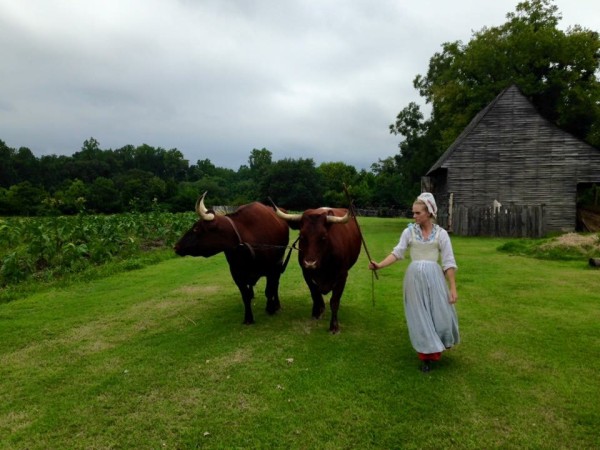
If someone would have told me a year ago I’d be taking nine of my colleagues out to Great Hopes Plantation to spend the day tending chickens, cooking, gardening, fetching water, and cleaning… I would have called you crazy. And yet, that’s exactly what we just finished doing. I’m still reveling in the experience and fighting off the disbelief. We did actually get to do this!
As Orientation Interpreters, my colleagues and I are truly Jacks (and Jills) of all trades. You’ll usually find us outside one of the 33 sites we interpret, in the backyards of the city playing games with visiting children, or giving orientation walks to new guests down the Duke of Gloucester Street. We’re often the first people you meet when entering a trade shop or site. In truth, our job is to make you feel welcome and help you find your way, in any way that we can, and almost always with a smile!
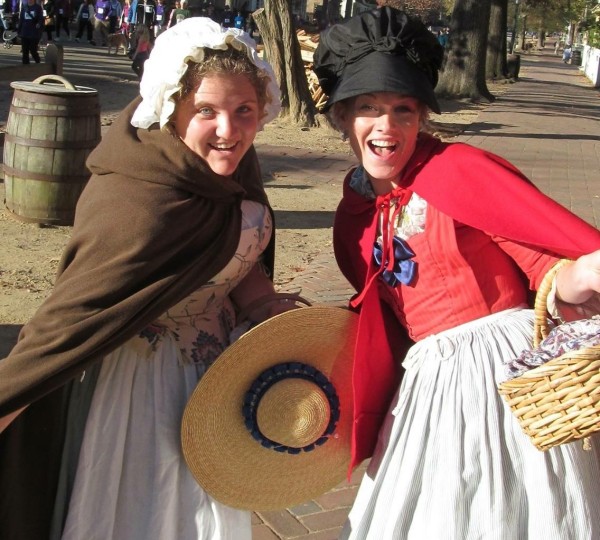 We strive to bring the city alive while interpreting and contextualizing its 18th-century history. We are also ready to answer any questions you may have. And let me tell you… we get asked some of the most interesting questions! It’s safe to say we OIs know the city inside and out and no day is like the one before.
We strive to bring the city alive while interpreting and contextualizing its 18th-century history. We are also ready to answer any questions you may have. And let me tell you… we get asked some of the most interesting questions! It’s safe to say we OIs know the city inside and out and no day is like the one before.
 But cooking, chasing chickens, and gardening? While OIs have fascinating days, those aren’t the typical adventures we usually encounter. So you might be wondering, how did we get mixed up in all of this? Really, it began with an experiment. Over the summer, our department decided to try something new and offered us the opportunity to stay at a site for two weeks straight, instead of rotating to a new place every day. The goal was for us to become more familiar with our sites and our colleagues who work there, as well as gain more knowledge about that trade to help enrich the experience for you, our guests.
But cooking, chasing chickens, and gardening? While OIs have fascinating days, those aren’t the typical adventures we usually encounter. So you might be wondering, how did we get mixed up in all of this? Really, it began with an experiment. Over the summer, our department decided to try something new and offered us the opportunity to stay at a site for two weeks straight, instead of rotating to a new place every day. The goal was for us to become more familiar with our sites and our colleagues who work there, as well as gain more knowledge about that trade to help enrich the experience for you, our guests.
After wildly successful results, it was on to the next experiment which was to allow some OIs to work at select sites of our choosing, more frequently. One of those locations was Great Hopes Plantation and I was a volunteer for both of these experiments.
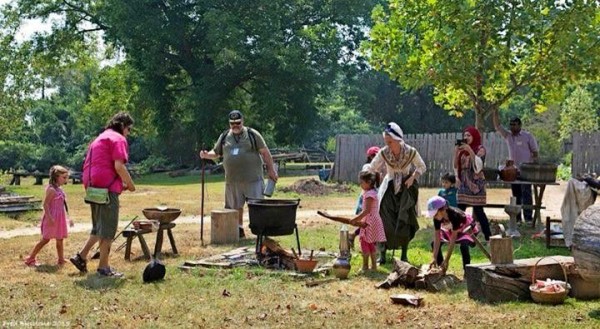 Great Hopes Plantation has gone through a rebirth in the past year and expanded its farming program in addition to creating a new trade’s program of Domestic Arts. The Domestic Arts staff seeks to preserve the diverse work of the “womanly arts” or women’s work in the 18th century on a plantation. The mistress kept things running in the household as well as the farm during the war years.
Great Hopes Plantation has gone through a rebirth in the past year and expanded its farming program in addition to creating a new trade’s program of Domestic Arts. The Domestic Arts staff seeks to preserve the diverse work of the “womanly arts” or women’s work in the 18th century on a plantation. The mistress kept things running in the household as well as the farm during the war years.
… she is a very civil woman and shews nothing of ruggedness or
Immodesty in her carriage, yett she will carry a gunn in the
woods and kill deer, turkeys, &c., shoot doun wild cattle, catch
and tye hoggs, knock down beeves with an ax and perform the
most manfull Exercises as well as most men in those parts.
-William Byrd II and Philip Ludwell n describing the common women of Virginia [1]
From gardening, to cooking, dairying, spinning, basic millinery, doctoring, educating her children, animal husbandry (shew), women had their work cut out for them. I was particularly drawn to the Domestic Arts due to my graduate research on Martha Ballard, a backwoods midwife in the 18th century, but also because of our guests. Day after day as an Orientation Interpreter I would be asked: What sort of work does a woman, like you, do in the home? What did regular people eat? Where did their food come from? How do you do laundry? Where do your clothes come from? And so on.
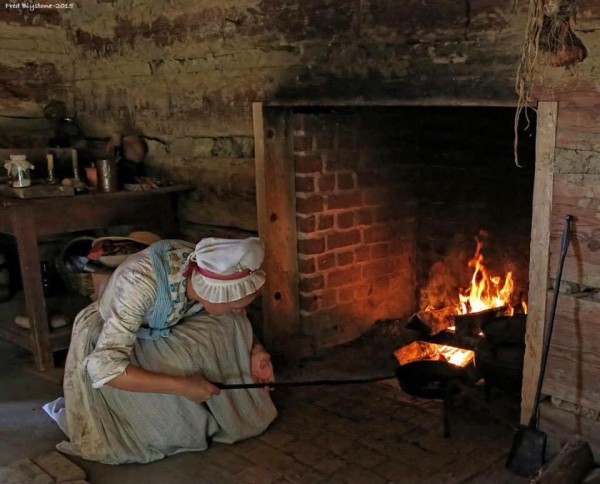 It’s one thing to read about what women cooked on an 18th-century plantation; it’s an entirely different thing to cook an Indian pudding during the heat of the summer in a hot kitchen! Or to start a fire using a flint and steel only to realize you don’t have enough eggs to make the pudding, so you have to run out and stalk the chicken coop. Then there’s the stress and pressure of balancing and completing all your work only to remember there are still hours more work left in the garden. Then, to top it all off, at the end of the day, noticing the squash bugs ate all the squash.While a comfort, that realization was also a reality check. While it was incredibly disheartening for us, in the 18th century, it would have been a true hardship. It’s in those reflective moments that the modicum of what these women experienced every day sunk in, and in a profound way.
It’s one thing to read about what women cooked on an 18th-century plantation; it’s an entirely different thing to cook an Indian pudding during the heat of the summer in a hot kitchen! Or to start a fire using a flint and steel only to realize you don’t have enough eggs to make the pudding, so you have to run out and stalk the chicken coop. Then there’s the stress and pressure of balancing and completing all your work only to remember there are still hours more work left in the garden. Then, to top it all off, at the end of the day, noticing the squash bugs ate all the squash.While a comfort, that realization was also a reality check. While it was incredibly disheartening for us, in the 18th century, it would have been a true hardship. It’s in those reflective moments that the modicum of what these women experienced every day sunk in, and in a profound way.
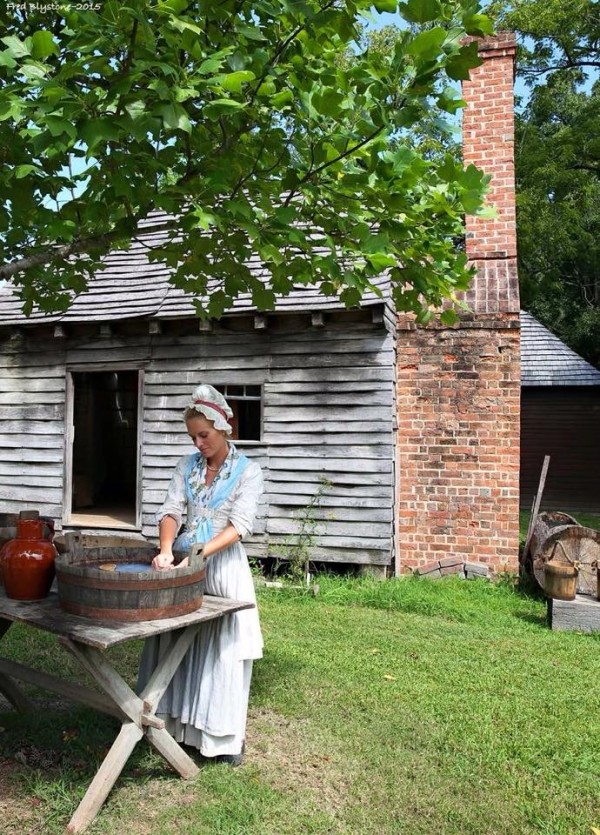 It was during one of those moments, an idea was born. What if we could serve internships internally here at Colonial Williamsburg? Instead of having to resign from one position to serve in another one, maybe we could do both simultaneously. Especially if the internship would help us grow professionally and help us better serve our guests? With the support of my supervisors Anthony Carter and Beth Kelly, and in partnership with Ed Schultz and Stefanie Dunn from Great Hopes, we took a leap and pioneered something new. And let me tell you, it was amazing!
It was during one of those moments, an idea was born. What if we could serve internships internally here at Colonial Williamsburg? Instead of having to resign from one position to serve in another one, maybe we could do both simultaneously. Especially if the internship would help us grow professionally and help us better serve our guests? With the support of my supervisors Anthony Carter and Beth Kelly, and in partnership with Ed Schultz and Stefanie Dunn from Great Hopes, we took a leap and pioneered something new. And let me tell you, it was amazing!
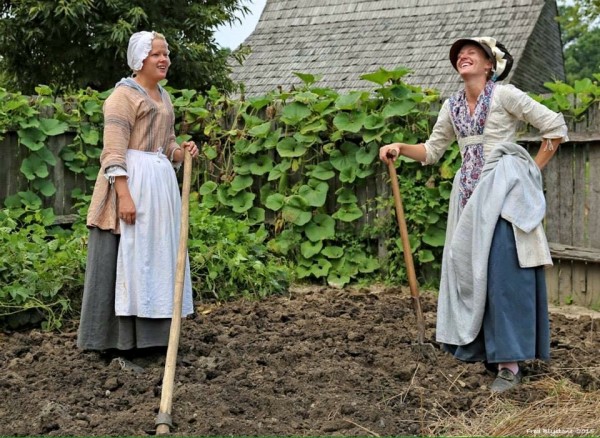 Under Stefanie’s guidance, the Domestic Arts Specialist at Great Hopes, I grew my skills and learned just about everything there is to know about the womanly arts. We bred, chased, brooded, and butchered chickens. We made soap and brooms. We daubed the Slave Quarters.We sewed, spun, and embroidered. We cooked (oh boy did we cook). We gardened, hoed, dug, and crushed way too many squash bugs (they’re evil).
Under Stefanie’s guidance, the Domestic Arts Specialist at Great Hopes, I grew my skills and learned just about everything there is to know about the womanly arts. We bred, chased, brooded, and butchered chickens. We made soap and brooms. We daubed the Slave Quarters.We sewed, spun, and embroidered. We cooked (oh boy did we cook). We gardened, hoed, dug, and crushed way too many squash bugs (they’re evil).
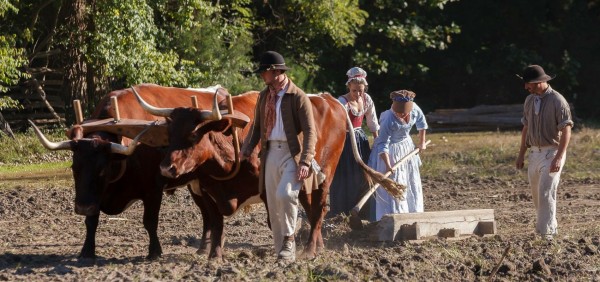 I also got to farm with the help of Ed, the Journeyman Farmer and Site Supervisor of Great Hopes, and his two Apprentice Farmers, Matt Sanbury and Cameron Green. With them, I got to drive oxen, tend the hogs, plow, cut and sort tobacco, pick cotton, and cultivate WAY too many hills of corn. I swear, I still have blisters.
I also got to farm with the help of Ed, the Journeyman Farmer and Site Supervisor of Great Hopes, and his two Apprentice Farmers, Matt Sanbury and Cameron Green. With them, I got to drive oxen, tend the hogs, plow, cut and sort tobacco, pick cotton, and cultivate WAY too many hills of corn. I swear, I still have blisters.
By the end of my internship, I had gained a new level of respect for both of these trades but also a new cerebral appreciation for what daily life was like in the 18th century for the majority of Virginians. After years of reading what a woman’s life was like, I now know and can viscerally communicate and share that with every guest I meet.
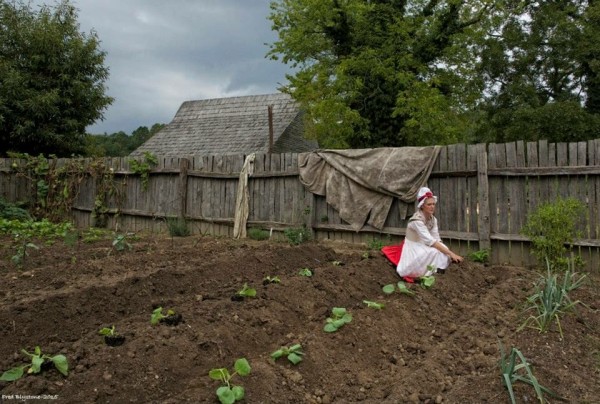 And I’m not the only one to reap the benefits of my experience. I was able to pass on my new talents to my Orientation colleagues. After all, knowledge is wasted if it isn’t shared, especially in the realm of the Domestic Arts, where we are a generation away from losing these skills!
And I’m not the only one to reap the benefits of my experience. I was able to pass on my new talents to my Orientation colleagues. After all, knowledge is wasted if it isn’t shared, especially in the realm of the Domestic Arts, where we are a generation away from losing these skills!
So all nine of us made the trek out to the farm. To say that it was a day we’ll never forget is an understatement. At least that’s what my coworkers told me. It was 48 degrees and we happily went about the day, just as a plantation mistress would. We began with tending the chickens and then moved into the kitchen to get the fire going and the food prepped. We prepared an Indian pudding from Amelia Simmons cookbook, American Cookery. We also dressed vegetables from our garden ‘the dutch way’ and made mutton broth for our stew from Hannah Glasse’s cookbook, The Art of Cookery Made Plain and Easy. Then our group headed into both the planters garden as well as the slave garden to knock down the hills and turn over the soil in preparation for the spring gardens. We also opened the well and fetched water to fill our washing tubs outside. Finally, as our time was ending, we had a chance to taste the fruit of our labors. The dishes went over quite well!
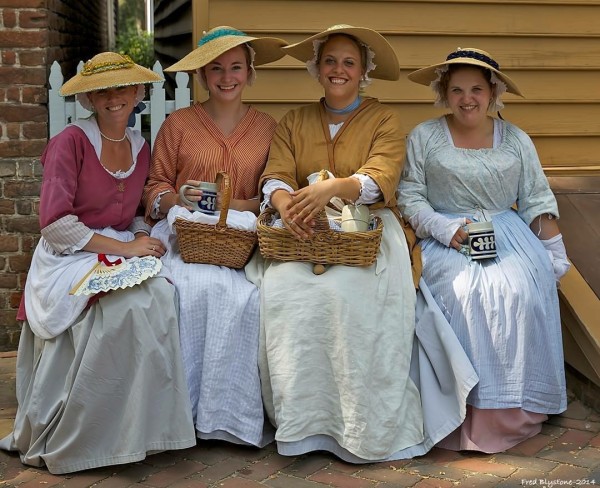 I feel so very fortunate to work in a place where we’re willing to try new things and are supported in our endeavors to do so. A year ago, I would have never thought it possible to have the experience I did at Great Hopes and be able to share it with my colleagues. Not only will we use what we learned on a daily basis while we’re interpreting in the Historic Area, but we built a bridge between ourselves and a part of the Foundation that we don’t often get to visit. I know we won’t forget Stef and Ed anytime soon, and I’m sure they won’t forget us.
I feel so very fortunate to work in a place where we’re willing to try new things and are supported in our endeavors to do so. A year ago, I would have never thought it possible to have the experience I did at Great Hopes and be able to share it with my colleagues. Not only will we use what we learned on a daily basis while we’re interpreting in the Historic Area, but we built a bridge between ourselves and a part of the Foundation that we don’t often get to visit. I know we won’t forget Stef and Ed anytime soon, and I’m sure they won’t forget us.
After my internship, I feel we are and can be truly call ourselves “One Foundation”. We are all a piece to the puzzle that makes Colonial Williamsburg great and able to reach and capture the hearts and minds of the people who visit us. For that, I’m grateful and still in disbelief that I actually live and work in a place where chasing chickens around an 18th-century buildings is just another day on the job.
[1] Byrd, William, II, and Philip Ludwell. “Full Text of “The Virginia Magazine of History and Biography”” Full Text of “The Virginia Magazine of History and Biography” Boundary Line Proceedings 1710, 1 June 1898. Web. 20 Feb. 2016.
GUEST BLOGGER: NICOLE JUSTICE GREEN
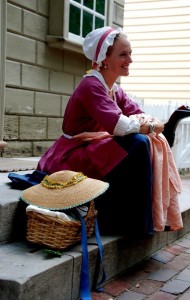 Nicole is an Orientation Interpreter and native Virginian who has been with the Foundation since May 2014. Her mother always told her she’d end up working for Colonial Williamsburg one day despite Nicole’s protestations (Mothers are always right!). Before she came to Colonial Williamsburg, Nicole stayed home with her children and kept a hobby farm for 5 years after graduating with the BA and MAT in History and Teaching from Christopher Newport University. She and her Husband Cameron live in the Greenbelt of the Historic Area with their three kids Deirdre, Jonas, and Brynna. Besides being obsessed with chickens Nicole loves to surf, paint, and visit historic sites with her husband. She’d rather give away her right hand than be parted from her history books. But if you ask nicely she’ll happily lend you one!
Nicole is an Orientation Interpreter and native Virginian who has been with the Foundation since May 2014. Her mother always told her she’d end up working for Colonial Williamsburg one day despite Nicole’s protestations (Mothers are always right!). Before she came to Colonial Williamsburg, Nicole stayed home with her children and kept a hobby farm for 5 years after graduating with the BA and MAT in History and Teaching from Christopher Newport University. She and her Husband Cameron live in the Greenbelt of the Historic Area with their three kids Deirdre, Jonas, and Brynna. Besides being obsessed with chickens Nicole loves to surf, paint, and visit historic sites with her husband. She’d rather give away her right hand than be parted from her history books. But if you ask nicely she’ll happily lend you one!
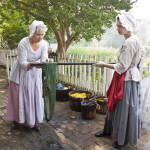
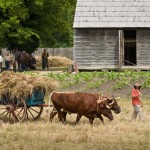
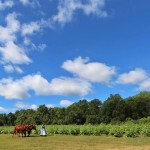
What does it mean when it says “she lives in the greenbelt of the historic area” ? I am trying to picture where this area is, Please enlighten us. I loved the article and wish this experience could be available to visitors. Maybe someday.
The green belt are homes just outside of the historic area that employers can rent, ex. near the Lodge and Merchant Sqaure.
I have always sensed a comradary among the interpreters and trades men and women at CW. I do believe the opportunities and experiences described in this blog will provide an even richer experience for the visitors. Having walked/worked a mile in each other’s shoes deepens the appreciation of the daily chores, joys and frustrations.
I found this internship very interesting. As a Family &Consumer Science educator with a love for history, especially in the domestic arts I would love to experience this. Our society seems intent on not understanding the process that goes into our food, clothing and lifestyle. Methods have changed, but bottom line the eggs still come from chickens. CW needs to offer teacher professional development in the domestic arts!
That is an awesome experience that will go so far! So wonderful that the Foundation is open to new ideas. I was an intern back in 1991 in Historical Research and I loved every moment.
Thanks for sharing this interesting look into your internship. Maybe sometime this kind of learning experience could be combined with children’s programming, adding the missing element from the plantation mistress’s day-the several children she probably would have been caring for along with all her other duties!
I wish all school children could experience a day like this. I think it would not only help them to appreciate what their ancestors had to deal with, but also make history come alive for them. Thank you for sharing!
An inspiring post.
There’s a goodness that comes from working the soil and tending a homestead. Our week of spring and fall planting as a family on our homestead is tough work but has become my favorite time of the year. Thanks for sharing your experience.
Thank you so much! It was an amazing experience and I’ll carry it with me always!